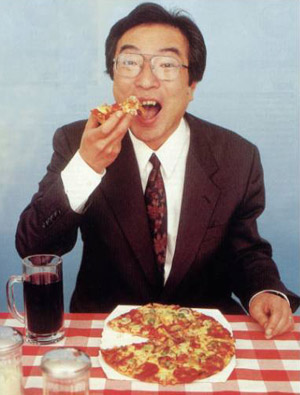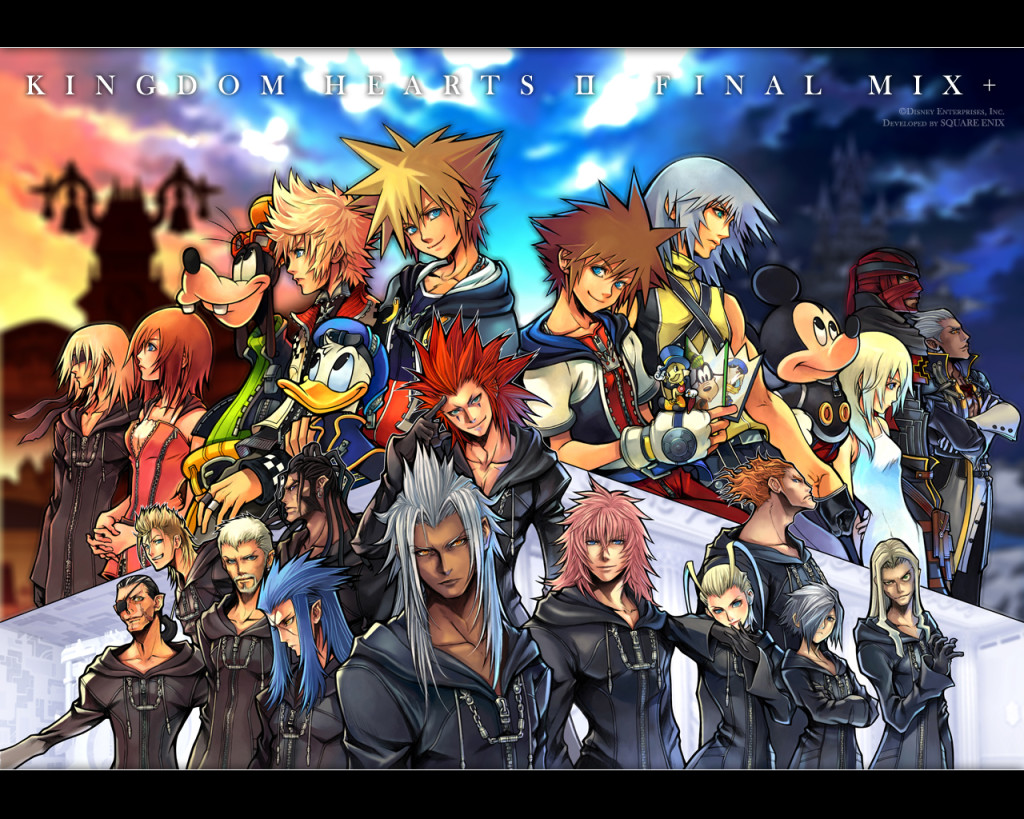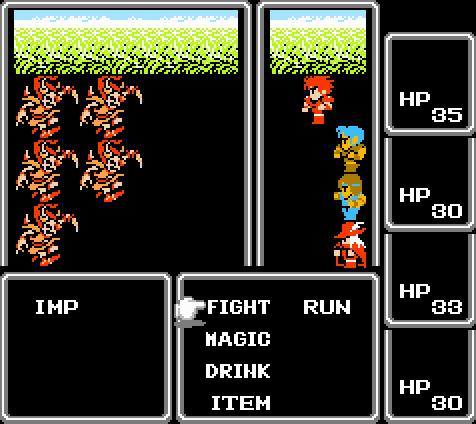Last updated on December 30, 2013
All flesh is grass, and all its loveliness is like the flower of the field.
7 The grass withers, the flower fades,
When the breath of the Lord blows upon it;
Surely the people are grass.
8 The grass withers, the flower fades,
But the word of our God stands forever.Isaiah 40
Do some games deserve remakes less than others? I’d like to think so. Two relevant examples come to mind, both of which arrived quite close to each other in the release schedule: Kingdom Hearts HD 1.5 Remix and Pac-Man Championship Edition DX+. We’ll add one more from my personal gaming playing; Final Fantasy. Let’s see what conclusions and ideas we can draw.
Critics almost universally consider the Pac-Man redesign to fully exemplify the feeling of old Pac-Man while adding new elements. Even with its relatively short playtime of five to ten minutes, it recreates the tension and speed of the original – or, at least, the perceived speed – while adding new elements like stationary ghosts and a larger board. This means that players looking to best the online scoreboards must memorize ghost locations and plan accordingly, as whizzing by ghosts will make them follow you.
As in the original game, you eat ghosts after a power pellet, except Championship Edition allows you to trail many, many more ghosts than the traditional five with an increasingly multiplier (up to 3200 points per ghost, if I remember right). The game gets faster and faster until it ends, rewarding skill and good planning along the way. No wonder people love it, including the creator himself; Toru Iwatani claims that he thought long and hard on how to improve Pac-Man, and this became the result. Heck, he even left the game industry soon after the original release of Pac-Man Championship Edition, confident that he fixed the game.

In that sense, Pac-Man deserved a remake, a rethink, and an improvement over an already winning formula to great success. Good games stand the test of time, and bad ones do not. Good games allow for substantial improvements with a few simple tweaks, while bad ones reveal their flaws when adapted to a new milieu.
Of course, we could simply call it a matter of time and place, but Christians like to think that the Word of God stands up to close scrutiny and examination – why not video games as well? We know it as a good book due to personal experience and history with it, finding ourselves reformed and reshaped as we read, reread, and re-examine the singular narrative thrust. We remark on new details with each reading, further adding to the whole. Yes, this somehow includes genealogies, which I began to find fascinating not just for what they truly represent, but also what they leave out (just compare Matthew and Luke’s differing choices). The Bereans were known for this, as Acts 17 tells us:
10 The brethren immediately sent Paul and Silas away by night to Berea, and when they arrived, they went into the synagogue of the Jews. 11 Now these were more noble-minded than those in Thessalonica, for they received the word with great eagerness, examining the Scriptures daily to see whether these things were so.
That intensive study led to the reams of text, documents, writings, and commentary that seek to help all of us understand this with the guidance of the Holy Spirit. So the Word of God continues to bring life, and life more abundant. But what of the bad alternative? How do we see the line between permanent and impermanent?
We arrive at Kingdoms Hearts HD 1.5 Remix. I will admit that in 2002, I found myself utterly enamored with the Kingdoms Hearts series. Coming off the era of Playstation Squaresoft titles, you would find yourself in the same position! As a fanatical Disney enthusiast as well, the marriage seemed made in heaven (interesting that a theology blog uses this phrase so nonchalantly, but allow me such a grievance!). In the end, I enjoyed my time with this strange action-RPG game with its somewhat awful jumping controls, its bizarrely unhelpful camera, and its simple (if enjoyable combat). I played it concurrently with friends, and all we could talk about was Kingdom Hearts. It remains a source of good memories and fun times.
That association did not continue when Kingdom Hearts II came out. The story, which started out as a lighthearted romp into Disney worlds, turned serious. Multiple factions, Heartless and Nobodies and Sephiroth lookalikes all, spoke in dark tones and mysterious intonations. Apparently, I missed Chain of Memories and became utterly confused as a result – not exactly an accessible way to reach the Disney audience! Unsurprisingly, Kingdom Hearts II received massive praise from nearly every publication, so my feelings remained in the minority. Something felt “off” about the whole game, where I simply mash the attack button and hope for the best. No strategy, no skill, no difficulty curve existed. Just smash the buttons until cool things happen and you win. Then, remain confused as to why you won.

To put the situation in context, I received the game in 2006, found myself utterly bored with it, and shelved the game. I figured in the future, I’d find time to play it and truly see whether the hype lived up to the game. Unfortunately, the 2010 landscape proved a dangerous place for Kingdom Hearts II to overcome, and finishing the game brought no further satisfaction. As you can see, the joy of playing Kingdom Hearts came less from its actual mechanics being intrinsically satisfying, and more from the communal aspect of playing said game. 2002’s simpler times meant Internet walkthroughs, videos and their ilk didn’t impinge upon your experience from the outset. You played, you talked, you played some more, and maybe you bought the BradyGames guide (which still kept some secrets to itself). Kingdom Hearts now appears a relic of a different time.
Kingdom Hearts II lost that innocent, lighthearted Disney magic for me, and that’s why I have no inclination to revisit the initial game. Seeing what the series became, and then what it will become (not looking forward to a third game of this type), means that I wish to keep my nostalgia intact. Some games just appear for a moment and then blink away; Kingdom Hearts, as a now decade-old (and some change) game does little to help Square-Enix out of its own self-destructive tendencies. The fact that they’ve changed little, if anything, in this PS3 remake mean I’m paying fourty dollars for HD resolution, several minor tweaks (as per the Final Mix rereleases in Japan) and a 3D version of Chain of Memories – bang for your buck, but not for your own enjoyment. Kingdoms Hearts did not age gracefully, and the lack of changes makes a poor case for playing it again.
That’s why, in a strange Derridean way, I’m inclined to say that playing games you know won’t appeal to you, or destroy your childhood, or even find yourself in a constant battle versus its flaws, aren’t useful to us. Scripture, for example, fits a round peg into a number of seemingly square holes. Even though it remains unchanging, it fits to every new generation and every Church equally. That classic quality vouches for its validity; the coming generations may change their interpretations, but it remains the same, and just as useful (1 Timothy 3):
4 You, however, continue in the things you have learned and become convinced of, knowing from whom you have learned them, 15 and that from childhood you have known the sacred writings which are able to give you the wisdom that leads to salvation through faith which is in Christ Jesus. 16 All Scripture is inspired by God and profitable for teaching, for reproof, for correction, for training in righteousness; 17 so that the man of God may be adequate, equipped for every good work.
The Bible presents a variety of genres, yet those genres all fulfill different functions for different people. Some person may find their answer in Chronicles, and others in the Gospels, but all find it equally in this wonderful library. Some books don’t appeal to some people: James, for example, never really appealed to Martin Luther, as he loved and emphasized God’s grace relative to his wrath.
Yet, on the other hand, unexpected titles burst forth with the renewed cyclical approach to “difficult” games. Enter Final Fantasy I. Long the bane of Square’s continued insistence that their beloved series defined video game storytelling, Final Fantasy pits four warriors of light (all named by you) against an evil force. That’s it! Cue thousands of random battles, dangerous dungeons, grinding, and learning enemy weaknesses. Surprisingly, this twenty-six year old classic offers plenty of fun in its initial incarnation, forcing you to play dungeons with limited resources.
In fact, I’d call the original Final Fantasy a bit of a Dragon Quest clone with a Western sheen of “true” roleplaying – the circumstances and layout may seem linear, but you craft your own battle tales and war stories as you play through the game. Those individual parts create the memories that will last when you play, the time when you hit an extraordinary lucky streak, or finished a boss by the skin of your teeth, or escaped a dangerous situation through your party member’s own wits and excellent use of skills.

It’s almost a shame that Square-Enix, when remaking the game, refuses to include settings that emulate the original difficulty level. Every remake from Origins onward (the PS1 port of Final Fantasy I and II, for those who don’t know) uses the “new” version of the game that allows for 99 casts of spells and grinding up to level 99. Contrast this to the original, which only allows UP TO nine casts of any one spells (at max level for any particular tier, as well!) and a level cap of fifty. I understand their need to make the older Final Fantasy consistent with the new ones, but it completely destroys the careful balance of the 1987 original. That’s unfortunate, because the original Final Fantasy, while different, holds up to close scrutiny and remains a classic. If you can stand grinding, of course!
But good games remain good games. Sometimes, tweaks hurt the original badly. Other times, they help the game in question eek out some extra potential, while a refusal to change at all creates a creeping disconnect between old and new. Thankfully, we do not need to worry about Scripture and the Word of God, for we know from Psalm 119:
89 Forever, O Lord,
Your word s settled in heaven.
90 Your faithfulness continuesthroughout all generations;
You established the earth, and it stands.
91 They stand this day according to Your ordinances,
For all things are Your servants.
If anything, we want to change it and we want to “improve” it. We can do such a thing through our own process of sanctification and renewing our mind daily. Our own personal improvement will eventually reflect on others, and so the cycle goes. Each culture will find different ways to take the Christian ideal to its fruition, and that will look different but the same…if that contradiction makes sense, you got it. Can something be perennial through the Holy Spirit and yet change in interpretation? Beats me, but that’s how it works in practice. Each case will require different emphasis and different Scripture, but that’s why it is a library and not just one book. There’s something for everyone, and that something invite conversation and discussion. I like that.
